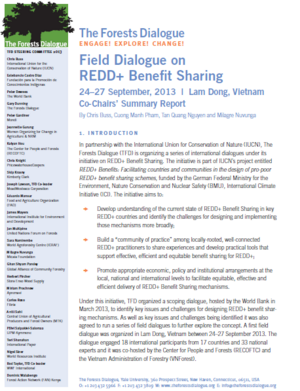Co-Chairs’ Summary: REDD+ Benefit Sharing Field Dialogue in Vietnam
In partnership with the International Union for Conservation of Nature (IUCN), The Forests Dialogue (TFD) is organizing a series of international dialogues under its initiative on REDD+ Benefit Sharing. The initiative is part of IUCN’s project entitled REDD+ Benefits: Facilitating countries and communities in the design of pro-poor REDD+ benefit sharing schemes, funded by the German Federal Ministry for the Environment, Nature Conservation and Nuclear Safety (BMU), International Climate Initiative (ICI). The initiative aims to:
- Develop understanding of the current state of REDD+ Benefit Sharing in key REDD+ countries and identify the challenges for designing and implementing those mechanisms more broadly;
- Build a “community of practice” among locally-rooted, well-connected REDD+ practitioners to share experiences and develop practical tools that support effective, efficient and equitable benefit sharing for REDD+;
- Promote appropriate economic, policy and institutional arrangements at the local, national and international levels to facilitate equitable, effective and efficient delivery of REDD+ Benefit Sharing mechanisms.
Under this initiative, TFD organized a scoping dialogue, hosted by the World Bank in March 2013, to identify key issues and challenges for designing REDD+ benefit sharing mechanisms. As well as key issues and challenges being identified it was also agreed to run a series of field dialogues to further explore the concept. A first field dialogue was organized in Lam Dong, Vietnam between 24–27 September 2013. The dialogue engaged 18 international participants from 17 countries and 33 national experts and it was co-hosted by the Center for People and Forests (RECOFTC) and the Vietnam Administration of Forestry (VNForest).
Dialogue participants spent two-days in the field where they discussed with local communities and government representatives about lessons learnt from Payment for Forests Ecosystem Services (PFES) and other application of other forest management activities/mechanisms, and how REDD+ Benefit Sharing may be designed based on those lessons learnt. Based on the field trip experiences as well as information shared by experts from Vietnam, dialogue participants had two days of facilitated discussions in both plenary and small groups in Dalat, Lam Dong. This report summarizes key observations and discussions from the dialogue.

